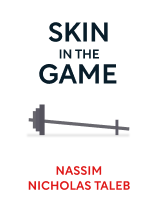

This article is an excerpt from the Shortform book guide to "Skin in the Game" by Nassim Nicholas Taleb. Shortform has the world's best summaries and analyses of books you should be reading.
Like this article? Sign up for a free trial here .
What is Nassim Taleb’s “skin in the game” philosophy? What does it mean to have your skin in the game?
In this book Skin in the Game, Nassim Nicholas Taleb deconstructs what we know about life and society with a new ideological framework that’s both unconventional in its insights and fundamentally human. By reinterpreting life in terms of risk and reward, Taleb demonstrates how “skin in the game” is the foundation of an honorable and fulfilling life and why shirking your fair share of risk is the root of all evil.
In this article, we’ll explore Nassim Taleb’s philosophy behind his concept of “skin in the game” and explain why Taleb finds it so important.
What Does It Mean to Have Your “Skin in the Game”?
Someone who has “skin in the game” has a vested interest in the outcome of an event—and, more importantly, has something to lose. At a rodeo, the rider on the bucking bronco has skin in the game, while the audience member eating popcorn in the bleachers does not.
Essentially, Taleb equates skin in the game to risk. The more you have to lose, the more skin you have in the game.
According to Taleb, our first impressions of how the world works are often not just wrong, but dangerously contradictory to reality. Understanding skin in the game is vitally necessary to accurately understand law, morality, politics, science, religion, and many other driving forces of our world.
| Origins of “Skin in the Game” Taleb originally formalized his view of “skin in the game” in his 2012 book Antifragile. The main idea of Antifragile is that a certain amount of stress and chaos makes some “antifragile” things stronger, like how breaking down muscle during a workout triggers growth. “Skin in the Game” was the name of a chapter near the end of that book, in which Taleb applies the idea of antifragility to ethics. People who don’t have skin in the game are essentially stealing antifragility, which is unethical. For example, if a popular finance pundit offered bad investment advice that drove up sales of his book, he would become more antifragile, profiting from uncertainty. It doesn’t matter if the advice works or not—he comes out ahead either way. However, the investors taking the bad advice would become more fragile, as they’re at greater risk of losing money. Most of the ideas present in the Skin in the Game chapter of Antifragile are repeated in this book. |
Why Put Skin in the Game?
Taleb believes that an ideal system—whether it’s a country, a company, or even a religion—is made up of as many people with as much skin in the game as possible. Why? Let’s go over the primary benefits of having skin in the game.
- Reason #1: Skin in the Game Teaches True Knowledge
- Reason #2: Skin in the Game Inspires Better Work
- Reason #3: People Behave More Ethically with Skin in the Game
Reason #1: Skin in the Game Teaches True Knowledge
Taleb is adamant that knowledge gained through direct experience is vastly superior to knowledge sussed out through abstract reasoning.
In any given situation, the only way to verify if your understanding is correct is direct exposure to the outcome caused by your understanding. Imagine a high school boy who is dying to know if a girl at school likes him or not. He could dissect every conversation they’ve ever had and come up with countless theories of what she was thinking and feeling, but the only way he can know for sure is by putting his skin in the game and asking her.
Individuals improve by learning from failure. The pain of real failure teaches far more than learning in isolation. Having skin in the game allows people to grow from their mistakes. An actress could read as much on acting theory as possible, but if she doesn’t go out and risk cold reception in auditions or on stage, she’ll never improve.
Likewise, systems improve by eliminating what doesn’t work. 90% of startups fail. If every business that wasn’t able to generate enough income to survive were given bailouts in order to continue running—if they carried no risk and didn’t have skin in the game—we would be surrounded by suboptimal businesses. Systems learn through elimination and filtering.
| Skin in the Game Gives Systems a Growth Mindset In her seminal book Mindset, Carol Dweck argues that the #1 predictor of success for a given individual is whether or not you have a “fixed” mindset or a “growth” mindset—that is, whether you believe that your innate abilities are set for life or able to be trained and improved. Like Taleb, Dweck stresses the importance of learning from failure—direct exposure to your own failure teaches more effective lessons than anything else. The most successful individuals understand that difficult challenges are the path to growth and actively seek them out. Skin in the game is the way to give systems a growth mindset. A market economy with entrepreneurs’ skin in the game, for instance, embraces difficult challenges in the same way a growth-minded individual would, as firms in competition rush to solve problems like inventing the best portable music player. Difficult challenges mean more elimination, which is a good thing, so we don’t get stuck with the Zune. Without skin in the game, systems are stuck with a fixed mindset. An office manager who’s too afraid to fire bad workers has created a system without skin in the game—bad workers are no longer at risk. As a result, the office will steer away from any difficult tasks and remain mediocre. |
Additionally, skin in the game reveals true character. Skin in the game reveals preferences. A man on a dating app may claim he loves hiking and adventuring, but if he spends his one day off of work watching Netflix, his true preferences have been revealed.
Similarly, skin in the game reveals who can truly do good and who is all talk. If two mayoral candidates both claim they care passionately about the plight of the homeless, but one candidate spends every weekend volunteering at nonprofits for the homeless while the other plays golf, their difference in true character has been revealed.
| In his book Story: Style, Structure, Substance, and the Principles of Screenwriting, screenwriting guru Robert McKee presents a view of the world that, interestingly, overlaps significantly with Taleb’s. “Choices made when nothing is at risk mean little,” he writes, “the greater the pressure, the deeper the revelation, the truer the choice to the character’s essential nature.” The more you risk and sacrifice, the more the image you project to others disappears. McKee asserts that skin in the game’s ability to reveal true character is one of the secrets to interesting, resonant storytelling. In stories, characters have to be under pressure to be interesting because only then do we get to see who they really are. |
Reason #2: Skin in the Game Inspires Better Work
On an individual level, people are more engaged when their skin is in the game. Specifically, they’re less likely to get bored, more likely to put in effort, they’ll make better decisions, and they generally feel more fulfilled. In fact, as we’ll see a little later, the key to fulfillment is to put as much skin in the game as possible.
A teenager would be much more engaged during her driver’s license test than during the drive to a friend’s house. This is because she has something to lose if she fails her driving test—skin in the game.
Ideally, all jobs would incorporate an element of skin in the game, tying rewards to results. One example of this is the commission earned by real estate agents. This incentive makes the job more exciting and encourages better work.
Without skin in the game, people are more likely to cut corners and put in less effort. Skin in the game is what makes work feel important—without it, you just don’t feel the need to do your best.
| Skin in the Game Puts You in the Flow State In Flow, psychologist Mihaly Csikszentmihalyi introduces the concept of the “flow state,” which has become ubiquitous in modern psychology. The term refers to the feeling of being “in the zone,” when you’re so engaged in what you’re doing that the world around you seems to disappear. Csikszentmihalyi argues that we should strive to be in flow as much as possible—not only is it enjoyable, it establishes “inner order” (a sense of deep life satisfaction) and helps you develop into a more complex individual. Skin in the game helps you get into the flow state in several ways—it almost always involves clear goals, immediate feedback, and the difficulty necessary to avoid boredom, all of which contribute to feelings of flow. The driver’s test mentioned earlier would check all these boxes. Additionally, having something to lose motivates you to tackle challenges that are initially uncomfortable, but put you in the flow state, contributing to a satisfying life in the long run. For example, people have skin in the game most often at work, where they report being in the flow state 54% of the time. |
Reason #3: People Behave More Ethically With Skin in the Game
People are less likely to give in to temptation if they know they’ll be punished if they get caught. Telling your four-year-old that he’ll get a time-out if he hits his brother is putting his skin in the game.
Another example: Taleb is a proponent of strong tort law as a means of compelling powerful corporations to behave ethically. The ability for wronged parties to sue puts corporations at risk. By making companies financially liable for their mistakes and misdeeds, tort law forces corporations to directly put skin in the game and act more ethically.
| Nassim Nicholas Taleb’s Personal Politics Taken together, Taleb’s three reasons for prioritizing skin in the game may be the foundation of his personal politics. Most of the time, Taleb is deliberately evasive about his political affiliation. He’s often presumed to be a libertarian for opinions such as this one, that tort liability is the best way to ensure corporate responsibility. However, Taleb has stated online and in interviews that libertarian isn’t the most accurate label to describe him, as he doesn’t see personal liberty as the highest virtue. Taleb makes it clear in Skin in the Game that whenever tort law is ineffective at curbing harm caused by corporations, government regulation becomes a necessity—he isn’t fundamentally opposed to the government. Instead, Taleb describes himself as “not a libertarian, but a localist.” The foundation of Taleb’s political belief is skin in the game. He believes that it’s unethical and destructive for anyone to obscure the mistakes they make at the expense of others, and as a result prefers local government over centralized government. Taleb has claimed that he is, in certain ways, both liberal and conservative. He’s liberal in the sense that he’s open to change, but he’s conservative in the sense that he wants change in the form of small incremental changes instead of sweeping reform. |
All codified law, since its beginning, has been intended to enforce penalties for actions with negative consequences—implementing a certain degree of ethics into society and forcing people to put skin in the game.
| Moral Philosophy: Taleb Versus Kant Nassim Taleb’s philosophy fits into a larger set of theories known as “consequentialism”—the idea that the outcome of an action, rather than its intent, determines whether or not it’s moral. The alternative school of thought is known as “deontology,” which holds that the morally right thing to do remains constant, even if the outcome of a specific action turns out poorly. Taleb acknowledges this divide, and specifically argues against one of the deontology’s most influential proponents: the Enlightenment philosopher Immanuel Kant. Both Kant and Taleb attempt to solve the same problem with their moral philosophies: People who believe they’re doing good often inadvertently do harm. Kant solves this problem by formulating universal moral laws that, if everyone followed, would result in a perfect world—taking the guesswork out of ethical dilemmas by providing objective rules. Taleb, however, argues that such universal laws do not exist. Since groups and systems of varying sizes behave differently, ethical laws that regularly do good on the individual level will regularly do harm at the systemic level. Despite Kant’s argument to the contrary, there is no way to articulate a perfect moral code, so skin in the game, as imperfect and sometimes impractical as it is, is the only solution. We’ll examine this idea in greater detail in Chapter 8 of this guide. |

———End of Preview———
Like what you just read? Read the rest of the world's best book summary and analysis of Nassim Nicholas Taleb's "Skin in the Game" at Shortform .
Here's what you'll find in our full Skin in the Game summary :
- Why having a vested interest is the single most important contributor to human progress
- How some institutions and industries were completely ruined by not being invested
- Why it's unethical for you to not have skin in the game






